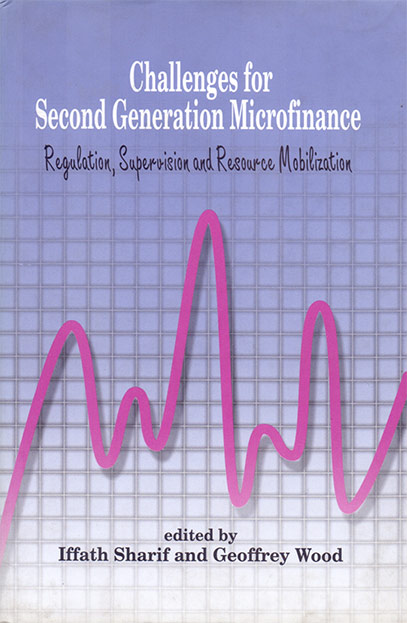- Shop
- Academic & Non-fiction
- Challenges for Second Generation Microfinance: Regulation, Supervision and Resource Mobilization
Challenges for Second Generation Microfinance: Regulation, Supervision and Resource Mobilization
https://uplbooks.com/shop/9789840515363-challenges-for-second-generation-microfinance-regulation-supervision-and-resource-mobilization-6533 https://uplbooks.com/web/image/product.template/6533/image_1920?unique=56f7a2e
| Language: English |
Tags :
Book Info
Two decades of development practice have highlighted the importance of financial services in the fight against poverty. Accordingly, microfinance organizations have scaled up their operations in many developing countries, with Bangladesh being a notable example. However, the traditional form of support for microfinance via donor grants and concessional loans is not sustainable. Microfinance organizations are, therefore, having to raise additional funds through private means such as deposit mobilization and commercial loans which in turn pose numerous "second generation" issues and challenges for the sector. Using Bangladesh as its context, this book presents some of these issues and concerns, as well as some general recommendations to minimize and manage the risks involved with "second-generation" microfinance. The book focuses on resource mobilization and the legal and regulatory framework for microfinance supervision. Case studies are also presented of microfinance organizations in Bangladesh engaging in sustainable microfinance. With its large-scale successful operations, the policy implications from Bangladesh microfinance organizations should be of interest to microfinance practitioners and policy makers in Bangladesh and beyond.

Iffath A Sharif
Iffath A Sharif was a Research Associate, working in the Policy Research Department of the Institute for Development Policy Analysis and Advocacy, Proshika. She has also served as a consultant to the United Nations Development Programme in Dhaka, working primarily on the UNDP strategy in the area of micro credit. She is currently working on financial sector reform issues and their relevance to the sustainability of lending systems for the poor in a Masters programme at Princeton University, USA.

ইফ্ফাত এ শরীফ
Iffath A Sharif was a Research Associate, working in the Policy Research Department of the Institute for Development Policy Analysis and Advocacy, Proshika. She has also served as a consultant to the United Nations Development Programme in Dhaka, working primarily on the UNDP strategy in the area of micro credit. She is currently working on financial sector reform issues and their relevance to the sustainability of lending systems for the poor in a Masters programme at Princeton University, USA.

Geoffrey Wood
Geof Wood is an Emeritus Professor of International Development at the University of Bath, UK. He was the Founder Director of the Institute for International Policy Analysis; Head of Department of Economics and International Development; Dean of Faculty of Humanities and Social Sciences; University Research Adviser, ex-Chair of Board of INTRAC, Oxford, and ex-President of the UK Development Studies Association. Dr.Wood arrived in Bangladesh in 1974. Since then, he conducted ethnographic and inter-disciplinary research on aspects of agrarian change, poverty, governance, and civil society in Bangladesh and Pakistan, and elsewhere, examining theories of insecurity, Faustian bargains, access, welfare regimes, strategies of de-clientelisation, extreme poverty and resilience, and de-peasantisation. He promotes the understanding of political economy via analysis of deep structures.



